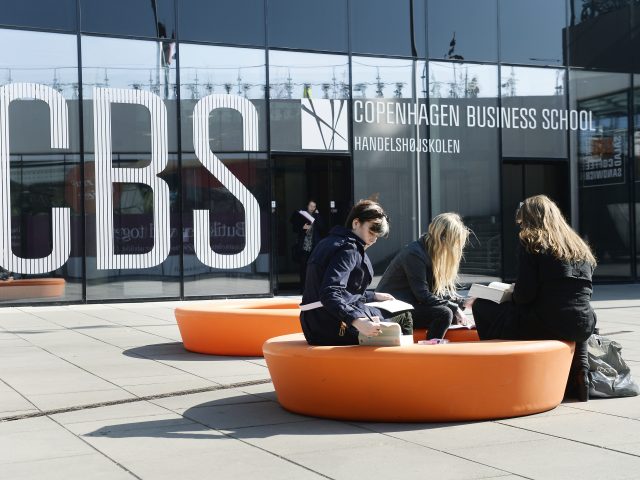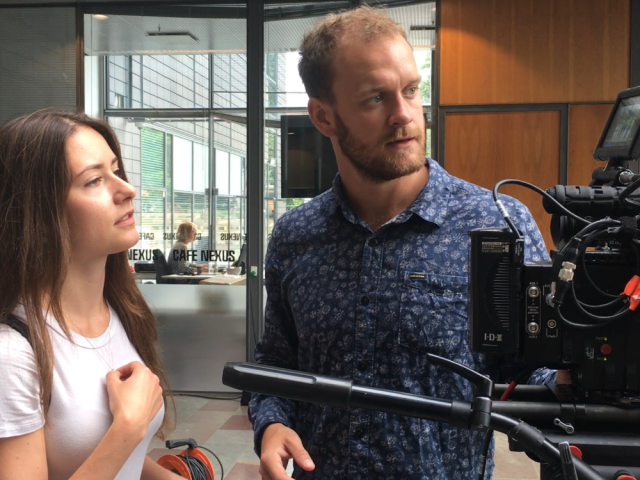The closing down of EOK does not equal job cuts for now

Even though EOK stops admitting new students next school year, no one will get fired as it is right now. (Photo: Anne M. Lykkegaard)
CBS management reassures us that no job cuts are planned for now, but points out that demand and supply in the field of language can change in the future. Furthermore, the Dean of Education, Jan Molin, responds to the criticisms that have been raised in the wake of the closedown.
“Closing the last language program at CBS does not include downsizing now. But the supply and demand in the field of language at CBS will be difficult to predict in the future,” says Jan Molin, the Dean of Education, in response to the question whether any members of the staff will be affected by the decision of closing down the Bachelor in English and Organizational Communication (EOK).
The decision for closing down EOK dates back to 2007. That year, an overall strategy for the bachelor’s portfolio – and especially the language focused programs – was agreed upon. This led to the fusing of departments and the closing down of language-based programs such as German, French, Spanish, Russian and Japanese over time.
Read more: CBS is closing down its last business language program
The overall ambition, according to Jan Molin, is to align the programs’ portfolio at CBS and make it more “transparent for students and companies alike,” as Jan Molin puts it.
Furthermore, CBS was and is increasingly in a financial position where it’s not viable to continue having language based programs.
“EOK was the last language based program left and as we are looking into a faculty profile where it will demand the recruitment of new researchers, we needed to make the decision now. This is partly because CBS doesn’t get that many research funds and there is no interest from Senior Management or the Head of the Department to keep investing in this area of research,” he says.
An unpleasant decision
When the decision was announced on the 14th of September, it was met with sadness and criticism.
“Very, very sad for the diversity of CBS’ program portfolio.”
“What they don’t seem to understand is that language is a bearer of culture.”
“Closing down the humanities programs is a step towards the further alignment of the programs at CBS. This is a dangerous tendency.”
“The process didn’t seem transparent at all.”
The decision-making process was especially up for debate. The student members of the Academic Council, Jeppe Ask Toftskov and Andreas Smith Jørgensen both point out – along with study board members Hanne Erdman Thomsen, Mette Skovgaard Andersen and Margrethe Mondahl – that the affected parties of the decision haven’t been properly involved and haven’t had the chance to share their views regarding the decision.
“This decision has been coming for a long time, as it is a part of the programs’ portfolio strategy process. Fundamentally, it should not be a surprise. There has been a formal investigation and a proposal of models over the last half year – and there has been an official ’hearing’. I fully understand that some might feel stung but everyone has had the possibility to give their opinions or ideas on how to reorganize their programs,” says Jan Molin and adds:
“No matter what, I can’t make an unpleasant decision pleasant.”
Business language will continue elsewhere
Both Dansk Industri and the trade union, Kommunikation & Sprog, argue that the demand for graduates who can master both business language and business economics is on the rise. At this point, CBS is the only institution educating graduates with exactly those set of skills. So, where does that leave the businesses asking for those kinds of graduates?
“We are not at all in doubt that there is a need for business language, but economically, CBS is not up to the job,” says Jan Molin and adds:
“I know that Per Holten-Andersen is advocating a national language strategy and that all language based programs are gathered at the University of Copenhagen and Aarhus University, as they have a greater amount of resources for running those types of programs. CBS will, of course, provide those programs with our expertise and make sure that Denmark continues cultivating graduates that are apt at business language,” he says.



































































































































Jan Molin’s arguments for CBS closing down all language degrees are unconvincing. Many fundamental issues still require clarification:
1) How can management close down all language programmes when CBS regulations (vedtægter) stipulate that there has to be research and teaching in this area (erhvervssprog) that until quite recently was an entire faculty?
2) Since the board (bestyrelse) has the duty of ensuring that the regulations are followed, what have they done to ensure that this takes place? Any change in the regulations requires the approval of the Ministry of Research, which presumably has not been sought. Isn’t the board responsible for the long-term implications of CBS failing to follow its own regulations and as a result failing to meet the needs of Denmark in the commercial world, and in the EU system, including the need for translators and interpreters?
3) Molin indicates that the progressive elimination of foreign languages has been management policy since 2007. However in 2011 the board insisted on establishing a bachelor degree in European Business with French, German, and Spanish that started in 2013, while simultaneously eliminating these languages at the masters level. Policy and implementation of these decisions was not transparent, in the experience of the staff who were directly involved (http://medie.cbs.dk/debat-ny-strategi-copenhagen-english-only-business-school).
4) Alan Irwin was Dean for Research with responsibility for merging two language departments to form the Department of International Business Communication in 2012. Irwin stated categorically that the position of foreign languages would not suffer as a result of the merger. Irwin, speaking for senior management, when Jan Molin was Dean for Education, assured me on 26 January 2012 that “the future of foreign languages (their linguistic and cultural aspects, translation, cognition, terminology, computational linguistics, European Studies et al) are not restricted” by the merger, or by the name that he decided on.
5) The board approved and endorsed a detailed and comprehensive language policy for CBS over a decade ago, and commissioned a second analysis of needs more recently, but management has failed to act on any of the recommendations. The conclusion that has to be drawn is that, unlike many universities in the Nordic countries, CBS consigns language policy to market forces that are not in harmony with national and institutional needs. So far as study programmes are concerned, there seems to have been a deliberate, largely covert, policy to eliminate what has been a key characteristic of CBS throughout most of its history.
6) Molin fails to mention the elimination of English as a subject of study. English has been reduced to a purely instrumental function, which no language is, least of all English in the modern world.
7) The decisions made by management represent a personal disaster for the remaining foreign language staff. This shows a total absence of pastoral care by management. I sense that colleagues feel they would have been treated better if they had actually been employed in the business sector rather than at CBS. In real business the leadership would be committed to firing people in a considerate way, assessing arrangements for re-employment elsewhere, and providing relevant in-service re-training. What they experienced was individuals needing to justify being “allowed” to stay on in perpetual insecurity, a discouraging and humiliating process.
8) It is true that there is a crisis at the national level in foreign language policy in Denmark, but CBS is aggravating this crisis rather than contributing to its solution. Cooperation with the University of Copenhagen (KU) has suffered as a result. In any case Humanities at KU are currently being subjected to massive cuts. It has neither the funding nor the expertise to take over CBS professional tasks, nor is there any firm evidence of this materializing – as the relevant head of department at KU has confirmed (https://uniavisen.dk/sprogligt-kraftcenter-mere-spin-end-virkelighed/).
9) I may merely sound like a grumpy old man, but my views on language policy issues are sought worldwide, recognized by UNESCO, the European Commission, and the international scholarly world (http://www.cbs.dk/en/staff/rpmsc). What is happening in Denmark, with CBS as an extreme case, is an embarrassment and a national tragedy. Higher education autonomy, academic freedom, and vision are virtues of the past.